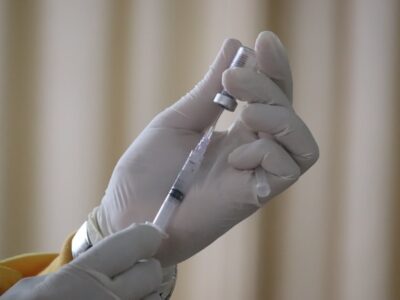The Food and Drug Administration has given the greenlight to a new monoclonal antibody treatment that appears to work against the Omicron variant.
Monoclonal antibodies are laboratory-created proteins that mimic the immune system’s ability to combat pathogens such as the coronavirus. Bebtelovimab, manufactured by Eli Lilly and Company, is a monoclonal antibody administered intravenously.
The Department of Health and Human Services announced on Thursday that it had purchased 600,000 treatment courses of the drug.
HHS is expected to receive half of the contract in February and the remainder in March. The contract also includes the option to purchase an additional 500,000 courses. According to Eli Lilly, the contract is worth at least $720 million.
Bebtelovimab can be used to treat people aged 12 and up who have mild to moderate Covid-19 and are at high risk of developing a severe form of the disease, or who do not have access to or clinically appropriate treatment options. It is not permitted for hospitalized patients or those requiring oxygen therapy.
Lab tests revealed that the treatment appears to be effective against Omicron, including the BA.2 subvariant.
The treatment reduced the time someone with Covid-19 had symptoms in a trial with people who were at a low risk of severe illness, compared to people who did not use it. The bebtelovimab group also had a lower viral load five days after treatment.
“With the emergence of variants such as Omicron, treatment options remain limited. Lilly is pleased to provide another treatment option to help address the ongoing needs of patients and health care providers who continue to battle this pandemic,” Dr. Daniel Skovronsky, Lilly’s chief scientific and medical officer and president of Lilly Research Laboratories, said in a statement.
Bebtelovimab side effects may include a reaction at the site of infusion, nausea, and vomiting.
Scientists have observed rare but serious events such as anaphylaxis, infusion-elated reactions, and hypersensitivity with other monoclonal antibody treatments, and the FDA stated that these events could occur with bebtelovimab as well.
“Today’s action makes available another monoclonal antibody that shows activity against omicron, at a time when we are seeking to further increase supply,” Dr. Patrizia Cavazzoni, director of the FDA’s Center for Drug Evaluation and Research, said in a statement. “This authorization is an important step in meeting the need for more tools to treat patients as new variants of the virus continue to emerge.”
In January, the FDA restricted the use of Regeneron’s monoclonal antibody treatment and Eli Lilly’s earlier versions of these treatments because they no longer appeared to work against the Omicron variant, which had been the dominant circulating strain for several weeks and now accounts for all new cases in the United States.
Those treatments had targeted a section of the virus that had changed as a result of Omicron.
Health experts are cautiously optimistic about the pandemic’s path, in part because the country now has access to more treatments, such as monoclonal antibodies, than ever before.
Sotrovimab, a monoclonal treatment developed by GlaxoSmithKline and Vir Biotechnology, is still believed to be effective against the Omicron variant. The US Army has agreed to pay $855 million to AstraZeneca for Evusheld, an antibody cocktail that appears to be effective against Omicron.
















